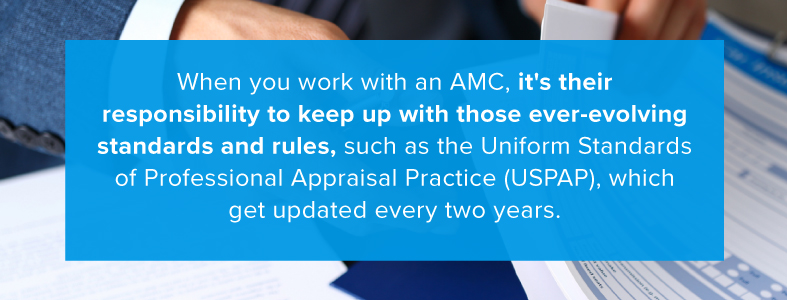Not too long ago, the process of appraising houses was a bit like the Wild West. In the years leading up to the housing crisis and recession, loan officers lenders had more of a hand in the appraisal process. In some cases, that led to lenders trying to influence appraisers to increase the perceived value of a home. In 2007, 90 percent of appraisers reported feeling pressure from someone — such as a lender, borrower or real estate agent — to inflate the appraised value of a home. In 2003 that number was 55 percent and I would like to know the current percentage now after more than 10 years have passed since the beginning of the housing crisis. For further research check out the link referencing the studies completed by October Research.
Some argue overvalued homes were among the causes of the housing crisis. As a result, regulations, beginning with the Home Valuation Code of Conduct in 2009 and carried on with the Appraiser Independence rules found in the Dodd-Frank Act, sought to build a wall between lenders and appraisers. That protection or firewall was in the form of appraisal management companies.
Enter appraisal management companies or AMCs. AMCs are independent companies that connect mortgage lenders to appraisers. The AMC is responsible for hiring the appraiser and for sending the appraiser's report to the lender.
While AMCs did exist before the big housing crisis, they weren't as prevalent as they are today. The bottom line or final rule requires there to be some division between lender and appraiser, and that the lender does not try to bias or influence the appraiser.
Although appraisal management companies aren't legally required, they can make things a lot easier for lenders. Keeping an in-house department to just manage the appraisal orders is costly and with new legislation, each part of the process should be vetted. With an in-house department, it is the bank's responsibility to insure that the separation or firewall that was intended is in place and is working. One of the biggest reasons to use an AMC is that doing so saves a bank, credit union or mortgage lender a considerable amount of time and money, there are several other reasons to work with an AMC, too.
If you're a small bank or community lender, and you think AMCs are only for the "big guys" or national banks, here are the top reasons to use appraisal management companies.
Why Use an AMC?
1. AMCs Help Lenders Improve Their Scheduling Efficiency
When it comes to getting an appraisal on a home, most lenders are working on a tight timeline. The closing date might be looming and the rate lock the lender offered the borrower might be set to expire soon. The clock is ticking.
One of the biggest ways AMCs help lenders is with efficiency. When a lender works with an AMC, the AMC takes on the responsibility of hiring the appraiser, giving the appraiser a deadline and making sure the appraisal report gets back to the lender in time. Lenders no longer have to worry about scheduling the appraisal, or about constantly following up with the appraiser to make sure everything is going as planned.

Additionally, they don't have to find time to track down and hire an appropriate appraiser. That frees lenders up to do other things, such as work with new customers or oversee the day-to-day management of their banks.
AMCs often have specific requirements for their appraisers, such as asking them to make an appointment to inspect the home within two days of receiving the assignment. Additionally, an appraisal management company might ask reviewers to complete their entire process within five days to help lenders meet their deadlines. To make sure there aren't scheduling issues, an AMC usually stresses the importance of the appraiser keeping in touch throughout the appraisal and review process.
2. AMCs Offer Thorough and Accurate Reviews
An appraisal management company does much more than just hire the appraiser and accept the report they provide, then pass the report on to the lender. It's also an AMC's responsibility to review the report to make sure all the necessary details are included and to ensure the report complies with regulations, including regulations from the state or federal governments and requirements put in place by the lender.
Reviews often take place in one of two ways. In some cases, a trained USPAP reviewer or an experienced and licensed appraiser will review the report, verify the report is USPAP compliant or depending on the review type verify that the technical details are accurate and confirm the person who appraised the property included enough information and facts to back up any claims made in the report.
If the reviewer notices any problems, missing details or information, they will follow up with the appraiser to track down that information.
In other cases, the review process is automated. When the appraiser submits the review to an AMC, the AMC usually checks it with software to make sure it contains all the necessary details. The appraiser's valuation can also be automatically checked by a computer system, using home values taken from similar properties. Automated reviews are usually the first stage of the review process before the report goes to a human reviewer. At SAMCO we feel that a straight automated review is not in the clients or appraisers best interest. The automated process doesn’t necessarily read the addendum notes and commentary. That is where many of your property exceptions are noted and we feel that this is a vital part of the review process.
3. AMCs Are Cost-Effective
A bank or lender isn't required to work with an appraisal management company. But if a bank or lender decides to fly solo, it will have to set up a partition between it and the appraiser. That can often mean hiring a team of people to handle the in-house process of hiring appraisers and reviewing their reports.
Usually, it is considerably more expensive to hire an in-house team to handle appraisal management than it is to work with an already established company. When you hire in-house, you are responsible for building your appraisal management process from the ground up. That means spending the time and money to create a program, as well as the time and money to find people to staff the program. On top of employee salaries, your bank will need to cover the costs of platform costs (unless you go old school and use email – which is a waste of employee resources), employee benefits and other perks.

On the other hand, if you hire an independent company to manage your appraisals, you can take advantage of the company's existing system for employing appraisers and reviewing their reports. You pay only the management fee required to the AMC, rather than salaries, benefits and the other costs involved in hiring full-time staff members.
Additionally, hiring an AMC means the lender isn't responsible for the cost of the appraisal management. The lender can pass the management fee on to the buyer as part of the cost of the appraisal. If you were to do things in-house, you would be responsible for the costs involved in hiring and managing appraisers and reviewing the reports.
4. AMCs Work with Qualified Appraisers
AMCs don't hire just anyone to appraise houses for lenders. They work with pools of qualified and licensed appraisers. Depending on the location of the house, they will send an appraiser who is knowledgeable and experienced in evaluating homes in that area. SAMCO appraiser’s KNOW their market areas.
Additionally, some AMCs also utilize "approved appraiser" lists from the lenders they work with. That means you can continue to work with the appraisers you like and also have the vast resources of the AMC’s appraiser list, even though you aren't managing them in-house anymore.
AMCs also have methods in place to work with appraisers on updates and to make sure they remain eligible for assignments and jobs.
5. AMCs Are Up-to-Date on USPAP and Appraisal Standards
Compliance rules and regulations are always changing when it comes to appraisals. What's legitimate one day might be bad news the next. It's a lot for lenders to keep track of, on top of managing the day-to-day business of prequalifying and approving customers for mortgages.
When you work with an AMC, it's their responsibility to keep up with those ever-evolving standards and rules, such as the Uniform Standards of Professional Appraisal Practice (USPAP), which get updated every two years. The most recent update is for 2018-2019. To help ensure appraisals meet current standards, many AMCs use software platforms with built-in compliance checks. If a report doesn't meet the most current requirements, it goes back to the original appraiser to correct and resubmit.

6. AMCs Are Experts in the Review of Official Appraisals and Regular Evaluations
Who's reviewing your appraisals and evaluations? If you are working with an appraisal management company, the answer should be a trained reviewer, someone who is either a licensed appraiser or who is supervised by a licensed appraiser. Just as it's important for AMCs to offer up-to-date review standards that meet the most current USPAP guidelines, it's also essential that they have a professional team of experts behind their reviews.
Additionally, an AMC should provide you, the lender, with every document connected to the appraisal. That includes the documents that explain whether or not the appraisal met USPAP and other standard requirements — and what changes were requested to make it compliant — as well as a quality score for the appraisal itself and service/professionalism score for the appraiser person who conducted the appraisal.
7. Independent AMCs Treat Appraisers Well
In the past, AMCs had a bit of a bad reputation, it's true. Some blame the 20 percent drop in the number of licensed appraisers in the U.S. since 2007 on the rise of AMCs. AMCs were the third-most-cited factor causing the decline of the industry, according to the 2017 National Association of REALTORS® (NAR) Appraisers Trends Study.
But it's important to understand not all appraisal management companies are created equal. There's a big difference between bank-owned AMCs — which are often operated by national banks and have a reputation for paying low fees to appraisers, according to the NAR study — and independent AMCs. While bank-owned AMCs have some of the lowest compensation rates in the business, independent AMCs have the highest compensation rates. According to the NAR study, independent AMCs pay more than 152 percent of the fee average to appraisers.
Along with offering the highest pay in the business, some independent AMCs also cover the costs associated with being an appraiser, such as a background check fee, national registry fees and many cover platform costs.
8. AMCs Offer Current Technology
Technology is always changing, just like regulations and standards. It can be difficult for a small lender or bank to keep up with changing security and technology requirements. But AMCs build their businesses around being able to offer both their customers and their appraisers the most up-to-date technology. Current technology means a lender can follow an appraisal along every step of the way, getting email notifications when the appraisal passes through each phase of the process until the final report is ready.
If you are technophobic, don't worry. Modern AMC platforms are designed to be very user-friendly. If you need any assistance, customer support is there to help you out.
9. AMCs Help Reduce the Risk of Fraud
One of the significant ways AMCs help lenders is in helping eliminate the possibility of fraud. By being the firewall or partition between appraisers and lenders, an AMC makes it so there's no question of pressure or of trying to influence an appraiser to boost the value of a home.

Additionally, under current regulations, AMCs are required to make it so appraisers can easily report any pressure or communication from the lender. Appraisers can quickly and easily send an email if they need to report any unethical behavior on the part of the lender or another party involved in the mortgage.
10. AMCs Improve Lenders' Relationships with Borrowers
Finally, one last reason appraisal management companies are useful: They can help lenders improve their relationships with their borrowers or customers.
You're probably well aware there's a lot of pressure riding on the appraisal. The borrower wants it to happen quickly, so the lock they've put on their interest rate does not expire. You want it to happen quickly and to return a decent value so you can make the loan to the customer. If banks or lenders were able to hire or provide appraisers on their own, without an independent, third-party serving as the intermediary, it's likely sparks would fly between bank and borrower.
A borrower might get upset with the lender if they thought the appraiser was needlessly delaying, potentially driving up their interest rate. Or, a borrower might wonder if the appraiser was working on the lender's team and the lender somehow influenced them to inflate or drive down the value of the home, negatively affecting the amount of the loan.
But since the AMC is there to serve as the neutral middle party, borrowers aren't likely to cast doubt on their lenders. It's clear both buyer and lender are on the same page — they want the home appraisal to come in, and they want to move toward closing so the buyer can move into the new home.
Although there are plenty of reasons to use appraisal management companies, it's important to remember some AMCs are better than others. Carefully review the services an AMC offers before you decide to work with it. For example, SAMCO specifically provides appraisers for small banks and credit unions. We offer independent review and auditing of every appraisal, overseen by a team of USPAP trained reviewers and licensed appraisers. We also let banks use our list of approved appraisers, and have a technology platform that keeps lenders in the loop throughout the entire process.
To learn more about working with SAMCO and our team of appraisers, contact us today.


Comments ()